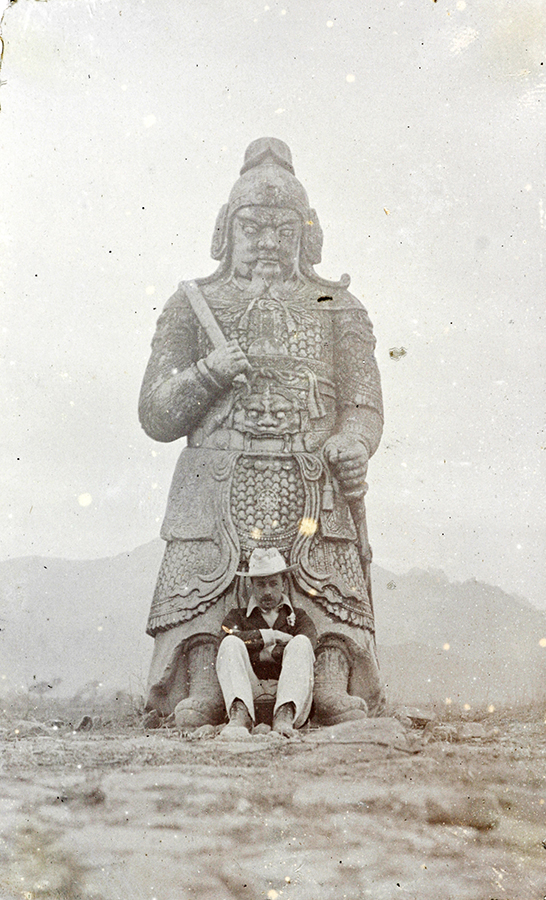
Man with statue of military official, guarding the Spirit Way to the Ming Tombs, c.1902: Ca02-115, © 2008 Queen’s University Belfast
‘Ming: 50 years that changed China’, the British Museum’s autumn exhibition opens today. Photographs in Historical Photographs of China of surviving artefacts from the 1368-1644 Ming dynasty include tourist silliness like this early 1900s shot of a visitor posing with one of the guardians on the seven mile Spirit, or Sacred, Way: the avenue of approach to the Ming tombs north of Beijing. But perhaps the contrast here tells us something about the Ming, the last Han Chinese ruling house, which was overthrown by rebellion and invasion by the Manchu state from the north, which established the Qing dynasty — still ruling when this photograph was taken. Our tourist, and others like him, might aim for an Ozymandias effect — ‘Look on my works, ye mighty, and despair!’ — but I rather think he has failed, and that the solid achievements of this dynamic period of Chinese history have overshadowed him. (And don’t you wish for the general’s right hand to fall?).
You can find exhibition blog posts here. For good introductions to the world of the Ming see Timothy Brooks, The Confusions of Pleasure: Commerce and Culture in Ming China, and Craig Clunas, Empire of Great Brightness: Visual and Material Cultures of Ming China, 1368-1644, and of course the quite stunningly beautiful exhibition catalogue, edited by Craig Clunas and Jessica Harrison-Hall, Ming: 50 years that changed China.
大英博物馆秋季特展“明:改变中国的50年”近日开展。“中国历史老照片”收藏的关于1368-1644年明朝文物的照片,包括一些游客的蠢萌行为,正如这张摄于1900年北京北郊明皇陵七里神道上,一名游客和其中一尊武将合影的照片。但也许这其中的对比正能看出明朝这一汉人统治的最后一个王朝,即便被叛军终结、被来自北方的满族入侵并建立清朝,在这张照片拍摄之时,仍有着统治地位。许多像他一样的游客旨在寻找着一种奥西曼迭斯效应——“强悍者呵,谁能和我的业绩相比!”[1]—— 但我宁愿相信他失败了,宁愿相信这中国历史的生动一页蒙蔽了他。(可别祈祷将军的右手掉下来砍断他的头哦?)
关于特展的更多信息可关注官网。想要了解西方学者对明朝的解读可参考翟莫西·布鲁克(Timothy Brook)的《喜人的变乱:明代商业和文化》(The Confusions of Pleasure: Commerce and Culture in Ming China)和柯律格(Craig Clunas)的《大明帝国:明代中国的视觉和物质文化,1368–1644》(Empire of Great Brightness: Visual and Material Cultures of Ming China, 1368-1644)。当然柯律格和霍吉淑女士(Jessica Harrison-Hall)策划的 “明:改变中国的五十年”精彩展览更是不容错过。
Chinese translation courtesy of Yuqun Gao
[1] 引自英国19世纪云雀诗人雪莱(Percy Bysshe Shelley)的一首14行诗《奥西曼德斯》(Ozymandias,1817年)。“奥西曼德斯”是希腊语对法老的称呼。“My name is Ozymandias, king of kings. Look on my works, ye Mighty, and despair! Nothing beside remains. Round the of that colossal wreck, boundless and bare, The lone and level sands stretch far away“(我是奥西曼德斯,众王之王。强悍者呵,谁能和我的业绩相比!在这巨大的荒墟四周,无边无际,只见一片荒凉而寂寥的平沙。)
